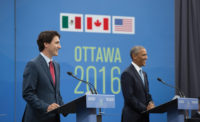After a series of negotiations between the U.S. and Canada on a new softwood-lumber trade agreement, the countries’ top trade officials say “significant differences remain” between the two sides but indicate further talks are planned.
U.S. Trade Rep. Michael Froman and Canadian Minister of International Trade Chrystia Freeland said in a June 17 joint statement that there had been “100 days of intensive engagement” and “significant advances in exploring the key issues and priorities.” But there is no deal yet.
Softwood lumber is a key material in the construction of single-family housing, though it also is used in multifamily housing.
Canadian exports of the lumber to the U.S. totaled about $4.6 billion in U.S. dollars in 2015, up from $4.3 billion in 2014, according to Statistics Canada. The shipments account for about 28% of the U.S. market for the product, according to the National Association of Home Builders (NAHB).
Froman and Freeland's statement noted, “While significant difference remain between us, this period of intensive engagement has helped define shared goals and explore options for several key components of any new agreement.”
The two countries “are committed to continuing negotiations in an effort to achieve a durable and equitable solution for North American softwood lumber producers, downstream industries and consumers,” the joint statement added.
Froman and Freeland didn’t say when further meetings would take place, nor did they identify the major outstanding issues.
Canadian lumber exports to the U.S. have been a long-running sticking point between the two countries. In 2006, the two countries signed a six-year Softwood Lumber Agreement that dealt with pricing and export levels of Canadian lumber.
Under the pact, the U.S. ended its antidumping and countervailing duties on Canadian lumber imports and refunded about $4 billion of an estimated $5.3 billion in duties it had collected from Canada since 2002.
Canada agreed to impose charges and set export limits on lumber it sent to the U.S. when prices fell below certain benchmarks.
In 2012, the pact was extended to October 2015, when it expired. Since then, the two countries have been in a one-year moratorium period, during which both sides will not launch unfair-trade proceedings against the other.
In March, positive steps emerged during a White House meeting between Canada’s new prime minister, Justin Trudeau, and President Obama. The two leaders directed their trade teams to develop options regarding the lumber export issue and said those options should be produced within 100 days.
Bilateral negotiations continued as the mid-June deadline drew near. Suzanne Beall, NAHB federal legislative director, in a June 14 interview said the U.S. recently had proposed a plan to reduce in stages Canada’s share of the U.S. lumber market, from the current 28% level to 22% over four years. But Beall said Canada favored “a clean extension” of the 2006 pact.
Jerry Howard, NAHB CEO, told ENR on June 14, “Our preferred outcome would be that there would be free trade between the United States and Canada.” He added, “I know that’s a long shot. But from our perspective, both legally and practically, that would be the preferred outcome.”
In the days leading up to the Froman-Freeland statement, there had been reports that the talks had not been going well. Howard said he wasn’t surprised at the status of the negotiations. “It’s déjà vu all over again,” he says.
Howard recalls, “Ten years ago, there was the same kind of fits and starts, which ultimately resulted in lumber price spikes [that] were disadvantageous to the consumers, and, in the end, an agreement was reached that was disadvantageous to consumers.”
Susan Yurkovich, president and CEO of the Vancouver-based BC Lumber Trade Council, said in a June 17 statement, "We continue to believe that a new agreement, if properly designed, can provide certainty and stability for lumber producers on both sides of the border."
But Yurkovich added, "However, if a reasonable agreement cannot be reached, we are also prepared to work alongside the Canadian government to defend the industry against any potential trade actions brought by the United States, as we have done successfully in the past."
Story updated on June 28 with comments from BC Lumber Trade Council



Post a comment to this article
Report Abusive Comment